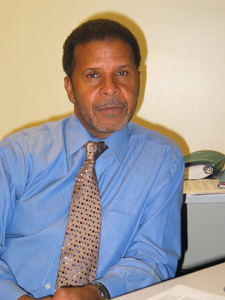 |
David Grandison, M.D., Ph.D. |
It is an attitude, they said, that values differing experiences and perspectives and welcomes culture, world viewpoints and gender.
In 2006, the goal formally became one of UNMC’s critical success factors complete with action steps.
“We’re making good progress, in terms of creating a culturally competent organization,” said David Grandison, M.D., Ph.D., director of UNMC’s Center for Reducing Health Disparities.
Dr. Grandison is leading the cultural competency effort outlined in the UNMC strategic plan.
“We’ve achieved a number of the milestones that have been established, but it’s an ongoing, dynamic progress,” he said. “It’s not something you can expect to complete in one year. It’s an educational and awareness process, and that is occurring.”
UNMC leaders are reviewing the results of an environmental assessment survey that will provide further insight into the medical center’s level of cultural competency, as well as ideas in how to further weave the issue throughout campus.
“There’s a real sense of support and excitement about the possibilities and opportunities that are in front of us,” said Anne Constantino, a diversity specialist for the College of Dentistry and Pharmacy.
This past fall, UNMC added a diversity component to its monthly employee orientation sessions for all new employees.
“We talk about what diversity and cultural competency are, how we define them at UNMC, our initiatives and the university and employee’s role,” said Linda Cunningham, who leads campus diversity and cultural competency efforts in the human resources department.
|
Per requests by individual departments, Cunningham has made numerous presentations across campus on cultural competence, including education related to the Culturally and Linguistically Appropriate Services (CLAS) standards, which were enacted in December 2000 by the U.S. Office of Health and Human Service Office of Minority Health.
The CLAS standards, which are addressed during UNMC’s new employee orientation, help eliminate racial and ethnic health disparities. One of the mandates requires health care organizations to offer and provide language assistance services at no cost to each patient with limited English proficiency.
UNMC also has made strides in the:
- Establishment of a new Diversity Advisory Steering Committee, which was formed earlier this year to advise the chancellor on such cultural competency issues as recruitment, hiring, retention and marketing.
- Establishment of a cultural competency and professionalism course — both traditional and online — in the College of Public Heath. The course is expected to begin this fall. Key members of the work group include: Janice Tompkins, Ruth Margalit, M.D., Alice Schumaker, Andy Jameton, Ph.D., and Mryna Newland, M.D.
- Implementation of an enrollment student management plan that more clearly defines long-range goals and priority recruitment areas. “We’re trying to make our recruitment activities more effective and efficient to reach more students in the changing population of Nebraska,” said Mary McNamee, Ph.D., assistant vice chancellor for academic affairs and director of the Office of Student Equity and Multicultural Affairs. “It’s a far-reaching initiative that looks at how we can impact the community, get the word out earlier, have people better informed on what it takes to pursue a health care career and the steps to get here.”
- Development of a “conversations group” in the College of Pharmacy, which brings together students, faculty and staff to discuss cultural competency and how it impacts future pharmacists.
- Organization of a heritage festival this June at the College of Dentistry.
In addition, the Employee Diversity Network (EDN) is being reorganized. EDN is an inclusive employee group open to all faculty and staff that promotes and supports internal networking, career development, cultural competency and diversity education.
Employees interested in participating in the group are encouraged to attend its initial meeting on Friday at noon in Wittson Hall, Room 3042, or contact Cunningham for more information.
On May 31, students from across the country will arrive on campus for the six-week Summer Medical Dental Education Program (SMDEP). Now in its third summer, participants will, for the first time, be assigned a specific area of health, such as childhood obesity or mental health, and research the related health disparities. Students will present their findings to the group and develop a program, project or flyer addressing the issue.
“We want them to be part of the solution,” Constantino said.
Cultural competency education also extends beyond the campus boundaries. Each year, the Rural Health Education Network (RHEN) and Area Health Education Centers (AHEC) sponsor a one-week Cultural Competency Workshop for college-age students to learn about the health professional’s role in providing culturally competent health care.
“The workshop provides a general overview of the growing cultural diversity in our state,” said Liliana Bronner, program coordinator with RHEN.
UNMC also is reaching younger ages. Each month, Lisa Jewell, director of the Youth Learning Center and her assistant, Michaela Bolamperti, provide hands-on learning for 350 to 400 students to interest them in health careers and the health sciences.
Once a month, they host middle school students from Bellevue, Omaha Burke, Elkhorn, Gretna, Jesuit Middle School fourth- and fifth graders; Millard; Papillion-Lavista and Omaha South. In addition to UNMC’s Community Academy program, which is available to all Omaha Public School students, they also do monthly meetings with Girl Scouts, as well as a number of one-time student visits. On a monthly basis, they also assist Compassion and Action, a community-based group that provides a safe haven for kids to do homework.
UNMC’s commitment to cultural competency is making a difference, but the work must continue, Dr. Grandison said.
“The data shows that our overall retention rate for underrepresented minorities has increased significantly. That’s a positive. But, this is an ongoing process,” he said. “Our accomplishments toward achieving the strategic goal of creating a culturally competent organization represent teamwork and commitment.”